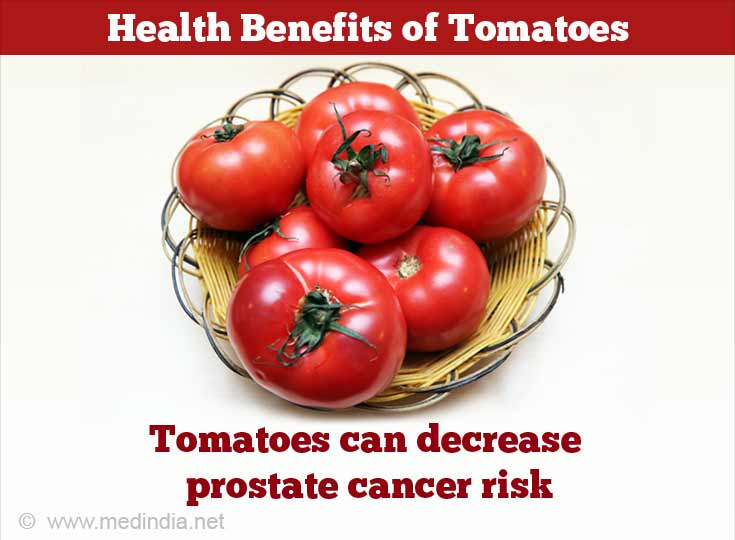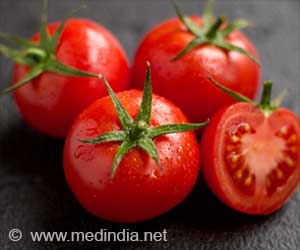- A Prospective Study of Tomato Products, Lycopene, and Prostate Cancer Risk - (http://jnci.oxfordjournals.org/content/94/5/391.full)
- Increases in plasma lycopene concentration after consumption of tomatoes cooked with olive oil. - (https://www.ncbi.nlm.nih.gov/pubmed/15927929)
Is It Good to Eat Tomatoes?
Tomato (Lycopersicon esculentum), the 'Love Apple' is a popular vegetable high in anti-oxidant lycopene. They are sweet juicy and healthy. Tomatoes are versatile as they can be eaten as a salad, in a sandwich or as gravy for vegetables – not to forget the 'all-important sauce.'

Eating tomato is great because this fruit/vegetable has plenty of health benefits. Tomatoes are non-starchy, low calorie and play an important role in the American diet today, that it is impossible to believe that till the 1800s they were considered toxic.
As a well-known nightshade vegetable, tomatoes are known for having a high potassium content. It is well known that potassium reduces the effects of sodium, which helps to lower blood pressure.
Health Benefits of Tomatoes
Tomato contains amazing amounts of lycopene which is said to have antioxidant properties. Studies have shown that tomato can reduce prostate cancer, especially in synergy with broccoli. A study published in the Journal of the National Cancer Institute suggested. ‘The intake of tomatoes and tomato products is associated with a decreased risk of prostate cancer. This benefit may be related to the antioxidant properties of lycopene, but other potential mechanisms and other beneficial tomato-based components instead of or combined with lycopene cannot be excluded’.
Another study published in the Asia Pacific Journal of Clinical Nutrition, found that when tomatoes are cooked with olive oil the body’s absorption of carotenoid phytochemicals including lycopene can increase.
Tomatoes are a rich source of potassium; a cup of tomato juice has 534mg of potassium and half a cup of tomato sauce has 454mg of potassium. Physiologically, potassium plays an important role in the transmission of nerve signals, fluid balance in the body and many other important chemical reactions. Potassium is used to treat high blood pressure, insulin resistance, chronic fatigue syndrome, muscle weakness, and even bloating and intestinal disorders.
Dr. John Cook Bennett of the Institute of Aberdeen found that the yellow gel surrounding tomato seeds could prevent clotting so as to prevent strokes and heart disease. Nutrients like niacin and folate reduce heart problems to a great extent.
Other health benefits include -
- Tomatoes work against impotency and help increase the sperm count

- Tomatoes are powerful blood purifiers and clear up urinary tract infections
- They have antioxidant properties as they are high sources of vitamin C and vitamin A. The vitamin A especially wards off macular degeneration and improves eyesight
- A person who drinks 8 ounces of low sodium tomato juice a day can be prevented from inflammatory diseases, osteoporosis and Alzheimer’s
- High in fiber, they are freely used by weight watchers
- They are good for improving skin porosity and are widely used in the manufacture of skin care and beauty products
- Including tomatoes in your diet on a regular basis may help prevent and treat high blood pressure
The Down Side
Some people may be allergic to tomatoes; their body cannot absorb and digest them.
In some individuals eating tomatoes in salads can lead to itching, hives and breathing problems.
Lycopene intolerance can cause bloating of the stomach, pain and diarrhea.
For some, eating tomatoes in any form can result in heartburn and reflux.
When a person has a history of kidney stones, it would be wise to eat tomatoes in moderation as the high oxalate and calcium bind together and kidney stones are a result.
Those diagnosed with irritable bowel syndrome will need to go slow on consuming tomatoes.
Eaten in moderation, they will not be harmful in any way. The nutritional benefits are many so there is no reason to avoid this simple, cost-effective and widely available fruit/vegetable.










